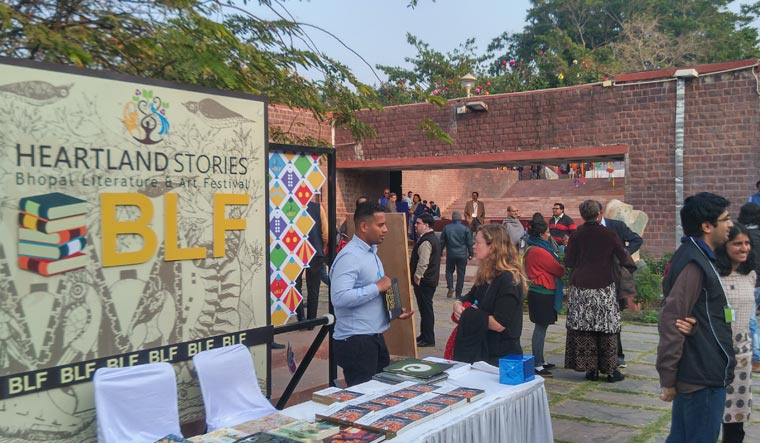A galaxy of leading authors and intellectuals descended on Bharat Bhawan, the multicultural art centre in Bhopal which hosted the three-day Bhopal Literature Festival (BLF).
Organised by Society for Culture and Environment, the festival—first of its kind in Bhopal—had special sessions by IFS officer Pavan K. Varma, Amitabh Kant from NITI Aayog, John Bowles, an art collector from the USA, former Madhya Pradesh chief secretary Anthony Desa, director of BLF Raghav Chandra and co-director Meera Das. The event was inaugurated by Union Tourism Minister Alphonse Kannanthanam on January 12.
Speaking in a panel discussion on the topic 'The path Ahead: Transformative Ideas for India', Comptroller and Auditor General of India Rajiv Mehrishi said, “We do not have good ranking in world hunger, per capita income and education. It means we are stuck with the wrong model. China and Korea are far better than us in per capita income. Whatever we do offers just a temporary relief, and not a permanent solution. Government needs to do less, they should get out from some sectors where they are not doing great."
Amitabh Kant said, “India need to focus on digitisation of manufacturing process to achieve its goals. We need to achieve speedy growth in urbanisation with innovative ways.’’
Former RAW chief A.S. Dulat had a session on his book 'The Spy Chronicles: RAW, ISI and the Illusion of Peace'. Dulat said after Atal Bihari Vajpayee, nobody thought in a serious manner about Indo-Pak relations. The session included a discussion on the contents of the book which is a conversation between Dulat and retired Pakistan military official General Asad Durani. The session also delved into the current ties between India and Pakistan.
There was also a session on the book 'Indian Mammals', written by Vivek Menon, documenting the comprehensive information on more than 400 species of animals, ranging from tigers to whales.
Eminent author and retired IFS officer Pavan K. Varma talked about his book in a conversation with Raghav Chandra. Answering a question on Hinduism, Varma said that Hinduism is a way of life and does not have one god or one prescribed form of worship.
The discussion on the book 'Race Course Road', a political thriller by senior journalist Seema Goswami, revolved around political personalities. The book is centered around the aftermath of the assassination of a sitting prime minister and the battle for succession that ensues within his family. The author's choice of characters and how she has managed to blend in current political scenario into the narrative were discussed in the session.
Eminent environmentalist Pradip Krishen, while discussing his books, said India has 3,400 native trees but we use only 50. Veteran journalist and wildlife expert Abhilash Khandekar was the moderator of the session.
In a session on Indian mythology and heritage, author Christopher C. Doyle was in conversation with Tejaswi Naik, the young IAS officer from Madhya Pradesh. Doyle spoke about how he got fascinated towards writing on Indian mythology. He said that we have rakshasas mentioned in our stories which are very identical with dinosaurs.
One of the most interesting sessions was a discussion on the book 'Kargil: Turning the Tide'. “It was first week of May when we got this information that there was an intrusion by Pakistan in one of the divisions in Leh. They had entered around 30-40 km beyond line of control,” Lt. Gen Mohinder Puri, the author of the book, said. He said Pakistan’s aim was to capture the unoccupied areas and make a fresh base for the militants. He recalled that when he was given charge of Kargil, his aim was to restore the line of control and open the line of communication for the civilians. The first aim was fulfilled in 50 days when Indian army captured Tiger Hills and ceased Pakistan.
Lt. Gen Puri said that credit for this grand success goes to the young officers who fought enthusiastically at the cost of their lives. While talking on the regimentation culture of Indian Army, he said one regiment is a small family of around 900 soldiers, and a soldier’s first commitment is towards the unit and then for the country. He further added that “being in uniform for 40 years, I must say that one should not tinkle the structure of regimentation. It is tried and tested structure for years.”
A discussion on the book 'Eternal Wisdom of the Tribes', edited by Raghav Chandra was centered around understanding tribal culture. Talking about his book, Raghav Chandra said tribals are the most neglected community in the country.



